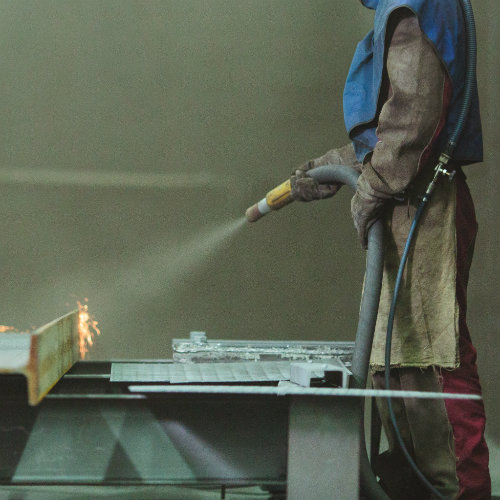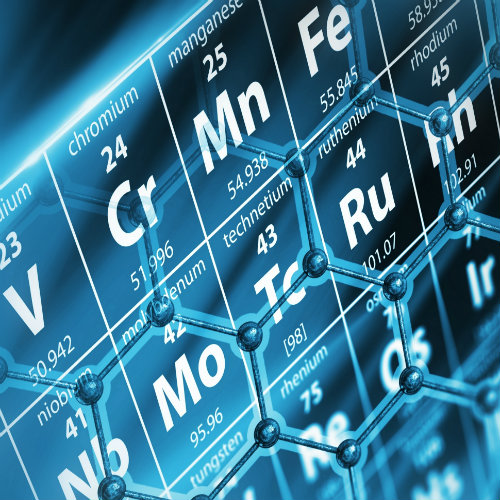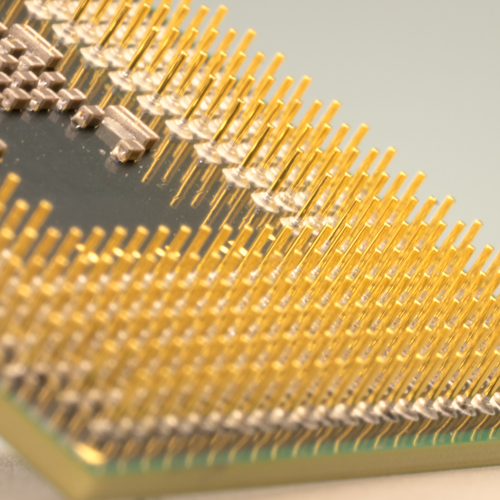Nickel Sulfamate
What Is Nickel Sulfamate?
Nickel sulfamate has superior ductility, low stress, and a lustrous finish, making it an exceptional choice for aerospace and high-tech industries. Favored for applications requiring a seamless blend of strength and malleability, this plating solution provides exceptional performance, crucial for the success of complex aerospace components.
The Process Of Nickel Sulfamate Plating
Preparation Of The Substrate
The success of nickel sulfamate plating begins with the meticulous preparation of the substrate. This typically involves cleaning to remove any contaminants, such as oils, dirt, or oxides, followed by a series of surface treatments to ensure optimal adhesion. The surface preparation might include processes like polishing, etching, or priming, depending on the nature of the substrate and desired finish. This initial step is critical because even minor surface impurities can significantly impact the quality of the final plating.
Composition Of The Electrolytic Bath
The key to the nickel sulfamate plating process is the composition of the electrolytic bath. The solution is mainly made up of nickel sulfamate, with its precise formulation customized according to the specific needs of the plating process. Additives, such as wetting agents or brighteners, may enhance the plating quality and achieve specific surface characteristics. The pH of the bath is also carefully regulated, usually maintained within a narrow range, to ensure the deposit’s consistency and integrity.
Electroplating
The actual plating occurs during electroplating, where the prepared substrate is immersed in the nickel sulfamate bath. A direct current is passed through the solution, initiating the electrochemical reaction that causes nickel ions to migrate and deposit onto the substrate. The thickness, uniformity, and overall quality of the nickel layer are governed by various parameters, including current density, bath temperature, and plating duration. These factors are finely tuned to meet the precise specifications of the plating job, ensuring a high-quality finish with consistent properties.
Post-Plating Treatments
After the plating is complete, the component typically undergoes several post-plating treatments to finalize its properties. These treatments may include thorough rinsing to remove any residual chemicals, drying to eliminate moisture, and heat treatment to improve the deposit’s physical properties. In some cases, additional processes like grinding or polishing can achieve the desired surface finish or dimensional accuracy. These post-plating steps are essential to ensure the plated component meets the rigorous quality standards required in high-performance applications.
Applications Of Nickel Sulfamate In Surface Finishing
Aerospace Industry
In the aerospace industry, the reliability and performance of components are absolutely essential and cannot be compromised. Nickel sulfamate plating provides outstanding corrosion resistance and the capability to endure extreme environmental conditions. Components like turbine blades, landing gear, and engine parts are often plated with nickel sulfamate to ensure longevity and safety in harsh operational environments.
Automotive Sector
The automotive industry benefits greatly from the wear resistance and durability offered by nickel sulfamate plating. Parts like gears, pistons, and fuel injectors, which face significant friction and wear, are frequently coated with nickel sulfamate plating. This treatment helps extend their lifespan and improve their performance.
Electronics And Semiconductors
In the electronics and semiconductor industries, where precision and conductivity are paramount, nickel sulfamate plating coats connectors, printed circuit boards (PCBs), and other components. Its excellent electrical conductivity and ability to form a uniform, smooth layer make it ideal for these sensitive applications.
Military And Defense
The military and defense sectors require materials that can withstand extreme conditions and rigorous use. Nickel sulfamate plating is often used in the manufacturing of firearms, communication devices, and other military hardware for its robustness and resistance to corrosion and wear.

Advantages Of Using Nickel Sulfamate
Exceptional Durability And Wear Resistance
One of the primary benefits of nickel sulfamate is its remarkable durability. The coating it produces is hard and resilient, significantly enhancing the wear resistance of the treated surfaces. This makes it ideal for parts exposed to constant friction or mechanical stress, ensuring a longer lifespan and reduced maintenance requirements.
Superior Corrosion Resistance
In environments where corrosion is a concern, nickel sulfamate excels. Its coating acts as an effective barrier against moisture, chemicals, and other corrosive elements. This quality is especially beneficial in industries like marine, chemical processing, and aerospace, where materials face frequent exposure to harsh conditions.
Enhanced Electrical Conductivity
For components in the electronics industry, electrical conductivity is a crucial factor. Nickel sulfamate plating improves the conductivity of the treated parts, making it an excellent choice for electrical connectors, switchgear, and other components where efficient electrical transmission is essential.
Uniform Coating Distribution
The ability of nickel sulfamate to form uniform and consistent coatings is a significant advantage. This uniformity is vital for applications requiring precise dimensional tolerances and smooth finishes, such as in optical and semiconductor devices.
Flexibility In Application
The versatility of nickel sulfamate plating allows for its application on many substrates, including various metals and alloys. This flexibility makes it a universal solution adaptable to numerous industrial needs.
Improved Aesthetic Appeal
Beyond its functional benefits, nickel sulfamate also enhances the aesthetic appeal of the coated parts. It imparts a smooth, glossy finish that is visually pleasing, which is desirable in consumer products and high-end applications.

Partnering With Valence For Your Nickel Sulfamate Needs
Choosing Valence for your nickel sulfamate requirements means selecting a path focused on quality, innovation, and customer satisfaction.
Leading The Industry With Uncompromised Quality
Valence’s dedication to quality goes beyond just meeting industry standards.
Our commitment to quality is clearly demonstrated in the superior quality of our nickel sulfamate finishes. Valence leads the surface finishing industry with an unwavering commitment to excellence, instilling confidence in various sectors with our innovative approach.
Scaling With Your Business
Modern industry’s ever-changing demands require a service that not only keeps up but also evolves in tandem with your business. Valence’s extensive capabilities in nickel sulfamate plating can be flexibly adapted to your evolving needs. As your business expands and progresses, Valence’s services adapt and grow with it, offering a dependable foundation that underpins your increasing success with skillful precision and strategic insight.
Service Reaching New Heights
Valence transforms the usual service provider-client relationship into a mutually beneficial partnership, driving your projects to their highest potential. Our personalized approach to nickel sulfamate plating services doesn’t just satisfy requirements. It exceeds expectations, breaks through performance barriers, and gives your business the advantage to excel beyond standard industry norms. By partnering with Valence, you gain an ally dedicated to elevating the quality of your components to new heights of excellence.
Frequently Asked Questions
What makes nickel sulfamate stand out among other plating solutions?
Nickel sulfamate stands out due to its superior ductility, low stress, and lustrous finish, making it ideal for aerospace and high-tech industries where precision is paramount.
How does the chemical composition of nickel sulfamate contribute to low internal stress and high physical resilience in finishes?
The unique chemical composition of nickel sulfamate fosters low internal stress and high physical resilience, resulting in finishes that prioritize both longevity and functionality.
Why is nickel sulfamate considered a cornerstone in aerospace and defense manufacturing, and how does Valence contribute to this reputation?
Nickel sulfamate is crucial in aerospace and defense, providing components with the fortitude to withstand extreme environmental challenges. Valence contributes by consistently delivering surface finishing solutions that affirm safety and efficacy.
Can nickel sulfamate be used for applications beyond aerospace and high-tech industries?
Yes, nickel sulfamate has versatile applications beyond aerospace and high-tech industries, including medical and life sciences, due to its precision and reliability.
What role does Valence Surface Technologies play in redefining the traditional boundaries between service provider and client in nickel sulfamate plating?
Valence redefines traditional boundaries by cultivating a symbiotic partnership with clients, providing personalized nickel sulfamate plating services that exceed expectations and elevate performance.
How does Valence contribute to the scalability of nickel sulfamate solutions, especially for projects with evolving needs?
Valence contributes to scalability by leveraging its robust infrastructure and adapting nickel sulfamate solutions to evolving project needs, whether for individualized prototypes or large-scale production.
Can Valence’s role in nickel sulfamate plating for commercial aviation be detailed regarding compliance with safety regulations and industry standards?
Valence upholds the highest safety standards by ensuring nickel sulfamate plating processes comply with stringent aviation regulations, fostering trust among airlines and passengers.
What is the turnaround time for a typical nickel sulfamate plating job with Valence?
The turnaround time can vary based on the complexity and scale of the project, but Valence prides itself on offering efficient services and meeting client timelines without sacrificing quality.
How does the visual appeal of nickel sulfamate contribute to the value of products?
Nickel sulfamate’s lustrous finish not only protects but also enhances the visual quality of the products, contributing to an improved aesthetic that can elevate the perceived value and brand image.
Can the nickel sulfamate plating withstand extreme temperature variations?
Yes, nickel sulfamate plating maintains its integrity under extreme temperature conditions, making it ideal for applications that experience wide temperature variations.
Plating Services
Cadmium Plating
Cadmium plating is a tough and versatile coating. The soft, attractive coating provides a favorable bonding surface for adhesions. It is also the preferred plating for salt-water environments due to its resistance to mold and bacteria.
Chrome Plating
Chromium plating is effective at providing excellent hardness and lubricity, reducing friction, minimizing wear, and preventing galling. In environments with corrosion or abrasion, chrome plating can withstand negative consequences on wear and tear.
Gold Plating
Gold plating advantages include good corrosion resistance, good solderability, and, when alloyed with cobalt, it has very good wear resistance. Gold is commonly used in electrical switch contacts, connector pins and barrels, and other applications where intermittent electrical contact occurs. It is also used as a radiation shield, in infrared reflectors and satellite electronic housings. Valence also offers immersion gold plating.
Manganese Phosphate
Manganese phosphate coating is a conversion coating, the formulation of which contains a manganese salt, phosphoric acid and an accelerator. This process is done under high temperature, and produces a surface that has good corrosion and wear resistance. Manganese phosphate coatings can retain oil and other lubricants.
Nickel Sulfamate
Nickel sulfamate is a plating process that provides a highly ductile plating surface with low internal stress. The versatility of the coating resists high temperatures, maintains high tensile strength, and provides ductility and elongation.
Ti-Cad Plating
Ti-Cad or titanium cadmium plating is a titanium cadmium combination plating that provides corrosion resistance on high strength steel applications. It significantly reduces the negative consequences of hydrogen embrittlement.
Tin Plating
Tin plating is used extensively to protect both ferrous and nonferrous surfaces. Tin is also widely used in the electronics industry because of its ability to protect the base metal from oxidation and corrosion. Depending on the base material, tin is used as a metal plating to maintain or impart solderability. Valence also offers tin lead plating.
Valence performs all of these services to the highest degree of care, with approvals for most prime, aerospace, and military specifications. Our products and services significantly enhance safety, long-term use, and consistency in the aerospace industry. View our specs here.
Plating Tank Sizes
| Valence Wichita | L | Valence Garden Grove | L |
|---|---|---|---|
| Cadmium Types I, II, III | 4′ | Copper Plate | 2′ |
| Electroless Ni-Mid | 4′ | Electroless Ni- Hi Phos | 6′ |
| Electroless Ni-Hi Phos | 2.5′ | Electroless Ni- Low phos | 3′ |
| Hard Chrome | 14′ | Electroless Ni- Mid phos | 7.5′ |
| Hard Chrome | 7′ | Gold Immersion | 2′ |
| TiCad | 4′ | Gold Plate – Grade A Type lll | 2′ |
| Gold Plate – Grade C, Type II | 3.5′ | ||
| Gold Plate – Grade D, Type I, Type II | 1.5′ | ||
| Gold Strike | 3′ | ||
| Nickel Plate – Bright /Semi Bright | 4.5′ | ||
| Nickel Plate – Semi Bright | 4.5′ | ||
| Nickel Sulfamate | 4.5′ | ||
| Silver Plate – Semi Bright | 3.5′ | ||
| Sliver Plate – Matte | 5′ | ||
| Tin Plate | 4.5′ | ||
| Tin/Lead Plate (60/40) | 3′ | ||
| Tin/Lead Plate (90/10-95/5) | 2.5′ |
Plating News
Chrome Coating: A Necessary Investment for Aerospace Components
Chrome coating is not just a crucial investment, it's a necessity for aerospace components that are exposed to harsh conditions during flight. It offers a range of benefits, including enhanced durability, corrosion resistance, and improved performance. If you want to...
Gold Plating: The Best Way To Protect Aerospace Components From Tarnish
In the aerospace industry, the significance of gold plating cannot be overstated. This process plays a crucial role in safeguarding vital components against the detrimental effects of tarnish and corrosion. Unlike alternative plating techniques, gold plating stands...
Understanding The Different Types Of Gold Plating
Gold plating serves as a renowned metal finishing strategy that incorporates a delicate gold layer onto a metal object's surface. This gold veneer delivers an array of advantages such as augmented corrosion resistance, superior electrical conductivity, enhanced heat...
Choosing The Right Finish: Anodizing Vs. Powder Coating
Choosing the appropriate finish for a project, such as anodizing or powder coating, can present quite a challenge. Both of these finishes have distinct advantages and considerations, making it crucial to fully grasp their unique characteristics to guide your...





